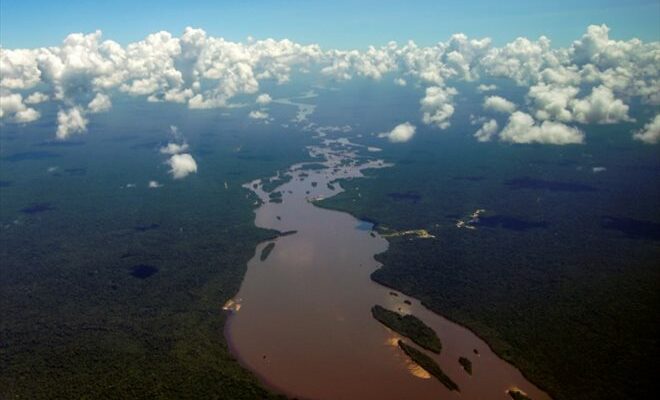A mural campaigning for the annexation of the Essequibo region administered by Guyana, on November 28, 2023 in Caracas, Venezuela (AFP/Federico PARRA)
“Essequibo is ours”, proclaims the official slogan plastered all over the streets: Venezuelans vote on Sunday in the referendum on this oil-rich territory that Caracas claims from Guyana.
Some 21 of the 30 million Venezuelans are called to the polls in this election which is causing concern in Georgetown and on the international political scene.
“Today we vote as Venezuela for one color, one feeling. We vote for Venezuela to be respected,” President Nicolas Manduro said after voting at a military fort.
Offices opened at 06:00 (10:00 GMT) and must close at 18:00. The results are expected in the evening.

Venezuelan President Nicolas Maduro during the campaign to close the referendum for the defense of the Essequibo territory, December 1, 2023 in Caracas (AFP/Pedro Rances Mattey)
The referendum – which is not a self-determination vote, Essequibo being under the administration of Guyana – will have no concrete consequences in the short term. Caracas seeks with the expected plebiscite to strengthen its credibility and its pretensions.
Authorities have stressed that they are not looking for a motive to invade the area, as Guyanese fear.
After Guyanese oil tenders and a new discovery of black gold in October, tension has risen in recent months with tough declarations, military exercises and talk of the installation of American bases.
Venezuela has claimed for decades this territory (sometimes called Guayana Esequiba) of 160,000 km2 representing more than two thirds of Guyana and where 125,000 people live, or a fifth of its population.

Border dispute between Venezuela and Guyana (AFP/Guillermo RIVAS PACHECO, Paz PIZARRO, Jean-Michel CORNU, Patricio ARANA)
Caracas maintains that the Essequibo River should be the natural border, as in 1777 during the Spanish Empire, and believes that the United Kingdom granted itself Venezuelan lands in the 19th century.
Guyana, which now has oil reserves similar to that of Kuwait and is at the top of the list of per capita reserves in the world, believes that the border dates from the English colonial era and that this was ratified in 1899 by a Court of Arbitration. The country has seized the International Court of Justice (ICJ), the highest judicial body of the UN, to have it validated.
Georgetown also appealed to the ICJ to try to stop the referendum, citing incitement to “the violation of international rights”.
– “Five times yes” –
In vain. In a decision on Friday, the ICJ ordered Caracas to “refrain from taking any action which would modify the situation in the disputed territory”, without mentioning the referendum.
Caracas had announced that it would not give up its organization whatever the decision.

Aerial view of the Essequibo region, September 24, 2022 (AFP/Archives/Patrick FORT)
“We believe that justice, not force, should be the arbiter of international disputes,” Guyanese President Irfaan Ali said on Friday at COP28 in the United Arab Emirates, where he met British Foreign Minister David Cameron.
Since COP28 in Dubai, Luiz Inacio Lula da Silva, the president of Brazil, a neighbor of two countries, has “hoped that common sense will prevail”.
“There is a referendum, which will probably lead to the result Maduro wants. (…) But if there is one thing that the world does not need, that South America does not need, it’s trouble,” added Lula.
The five-question referendum asks Venezuelans in particular whether they agree not to recognize the jurisdiction of the ICJ, to refuse the 1899 agreement which would have been “fraudulently imposed” on them and to integrate the territory into Venezuela .
“Five times yes”, insisted the Venezuelan authorities during an omnipresent campaign in the media and which mobilized significant resources with demonstrations, advertisements, conferences, military parades…
The opposition, which as a whole claims Essequibo, has been reserved on the subject, torn between its convictions and the obligation to support the government before the 2024 presidential election.
For the main opponent Maria Corina Machado, the referendum is a “distraction” in the context of political and economic crisis but also an “error which does not defend our territory”.
In the street, many Venezuelans say they are motivated: “We have a commitment to the country,” says Marlis Palmes, a housewife in Caracas. “Those who agree, I congratulate them; those who do not, history will judge them.”
© 2023 AFP
Did you like this article ? Share it with your friends using the buttons below.




